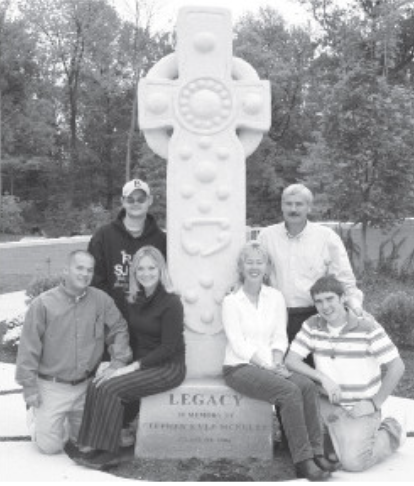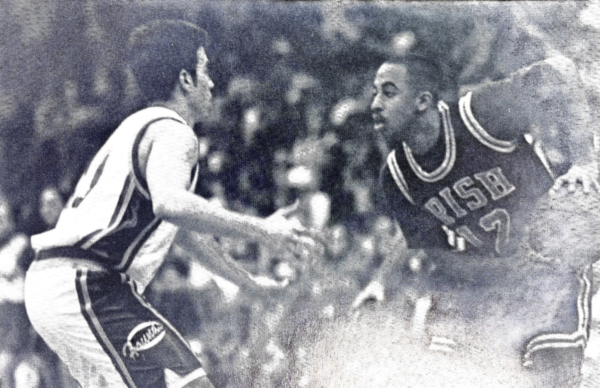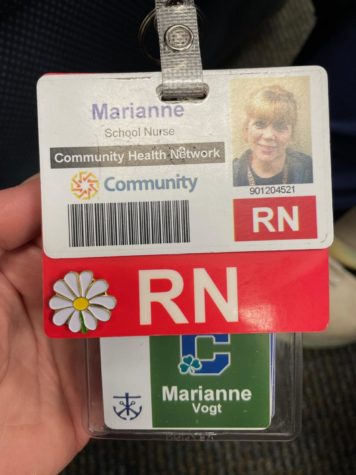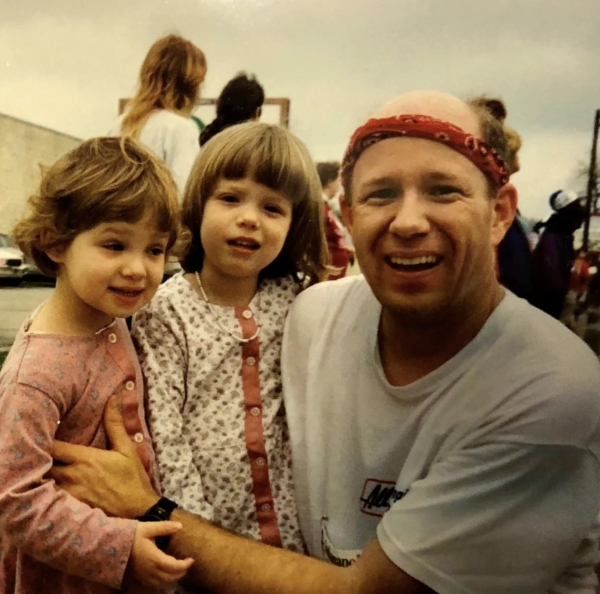(M)r. Cannaday’s (S)tory
Religion teacher diagnosed with multiple sclerosis and the journey to power through what it takes to overcome.
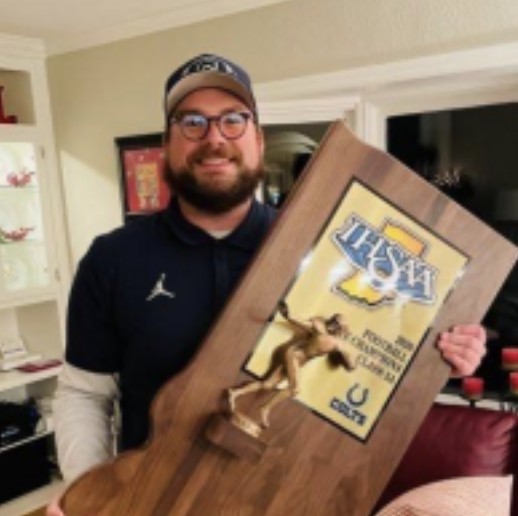
Mr. Cannaday is all smiles posing with the football state championship.
“It started that Thursday, during the second week of J-term this year, 2022. I woke up that Friday morning and felt kind of off balance. I was shading to the right as I walked. That was weird! Covid was really big at the time so I thought maybe it was a covid thing. I hadn’t had covid yet. I got tested. I was negative. I missed school. I thought I was only going to miss school for a week. Then about a week later, I went to write my rent check and I couldn’t write. I knew what I wanted to write, but my hand wouldn’t respond. So I thought I was having a stroke,” said Religion teacher Mr. Matt Cannaday.
A week of worrying and ‘not feeling right’ later the decision to seek medical attention was simple.“My BP was elevated. Cholesterol was nuts. I had a spot on the CT scan in my brain and they didn’t know what it was. My symptoms kind of stayed the same for a while. I wasn’t being treated for anything except high blood pressure and what not. I had to get a bunch of other blood work done and a four and a half hour MRI with IV,” Cannaday said. “There were still other tests I had to do though. In the meantime my symptoms worsened. They got progressively worse to the point where I really couldn’t walk. My right side was numb. I couldn’t hold a fork with my right hand. I was dragging my right foot for the most part. I went to Community’s emergency room on the south side and that was when the final diagnosis came in, that it was MS.”
With fewer than 200,000 cases of Multiple Sclerosis in the United States per year, this diagnosis is not very common. “(Multiple Sclerosis) is a neuro degenerative disease in which the casting of your nerves, myelin, gets attacked by your immune system. Your immune system gets confused and starts attacking the covering of your nerves. This in turn weakens your nerves and creates scarring on your brain. Some people have it in their thoracic cavity while others have it only in their spine. Which creates these lesions, these scars, all up and down. It’s contained to my brain, so that’s the only place I have it,” Cannaday said.
Because it is rare, there are many things unknown about it. “It is a completely unpredictable disease. Two thirds of people who have it are women. So I’m in the minority there. We don’t know what causes it. It’s not genetic. If your parents have it, you are three percent more likely to get (MS). But that’s not too significant of a statistic. Everyone’s experience is different. For me, I am pretty blessed with my experience of it. I’m just tired all the time and I occasionally feel numbness,” said Cannaday.
However the push to find a treatment continues. “They pumped me full of steroids for five days in the hospital. Within a couple weeks, I felt normal. I felt back to myself. I came back to school after spring break but still didn’t have any treatment for it, because they were trying out different things,” Cannaday said.
Despite the challenges and hardships that he was then forced to overcome, there was hope. The doctors came up with a treatment plan. “Now I’m on a treatment where I get an IV once every 6 months. Most people would have no idea anything’s wrong with me. Usually when I’m tired my words will slur a little bit. I have trouble remembering things. My memory is not what it used to be. For the most part, heat affects me. So I have to be really careful when it’s hot outside, to stay cooled. To stay hydrated, I drink a lot of water or Gatorade,” said Cannaday.
Although having this official treatment, his life looks different now as a teacher than it did before. “I’m almost always tired, fatigue is a pretty universal symptom of it. So I have to be very deliberate in what I do, how I go about lesson plans and how I go about the way that I teach. I have to listen to my body a lot more than I used to. I used to be able to power through sickness and power through tiredness and fatigue and now I can’t do that and if I do that, symptoms could rise up so I have to be careful with that. I have to sit down more often than I used to. I can’t stand the whole day. It is tiring. My diet has also changed to reduce inflammation in the body,” Cannaday said.
While so many aspects of his life has changed, his outlook on life has allowed him to receive great opportunities. On Tuesday Nov 29 2022, Cannaday was nominated by the National MS Society to participate in a fundraiser to help raise awareness and increase research in finding a cure. “I am going to represent the national MS society in a 5K in Walt Disney World. Disney has several race weeks throughout the year. This one they are partnering with the national MS society to not only to raise money for resources for us who have it but to raise money for research that can be done to mitigate symptoms and to help promote new drugs and therapies for it and to help get to the root of what causes it,” he said.
“That’s still the weird part. We have no idea what causes it. There are some links that we think might like there is a particular virus that might play a role with it but we don’t know that for sure. And I think the more funding we get for it, the more research we can do to bring awareness to it and eventually cure it. I’m hoping it becomes one of those things like polio where at some point we have exactly what we need to know and no one is going to have it anymore that’s kind of where we are at with it,” said Cannaday
His journey has shown him many lessons along the way. “It has taught me to be more disciplined in prayer. In fact one of the first documented cases of MS is a saint (Saint Lidwina),” Cannaday said. “If she could become a saint and not have any treatment that to me gives me more to look forward to. (MS) has taught me to be resilient in that regard to find ways to stay hopeful and active and not be taken down by it in more ways than it already does. It’s really done its job in teaching to be prayerful even when I don’t want to, which is often because it is a distressing illness.”
While allowing faith to play a role it fills him with the hope that one day in the future everything will come together as planned. Cannaday said, “I still live as normal of a life as you could really live with it. I think I’ll give it a year though and I am confident that I am going to be in a better place. I think that’s half the battle.”

Avery Stuckey is a senior and managing editor on the Megaphone staff. She has been on the staff since she was a freshman. She enjoys playing golf as well...


